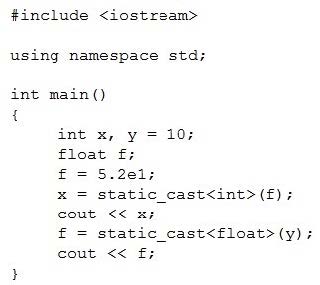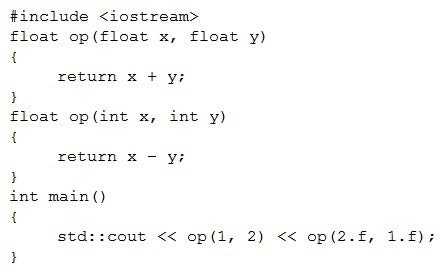CPA-21-02 Online Practice Questions and Answers
What happens when you attempt to compile and run the following code?
#include
#include
using namespace std;
class A {
public:
int x;
A() { x=0;}
};
class B {
public:
int x;
B() { x=1;}
};
class C :public A, public B {
public:
int x;
C(int x) {
this?>x = x;
A :x = x + 1;
}
void Print() { cout << x << A::x << B::x; }
};
int main () {
C c2(1);
c2.Print();
return 0;
}
A.
It prints: 1
B.
It prints: 121
C.
It prints: 111
D.
It prints: 2
What happens when you attempt to compile and run the following code?
#include
using namespace std;
void fun(int);
int main()
{
int a=0;
fun(a);
return 0;
}
void fun(int n)
{
if(n < 2)
{
fun(++n);
cout << n;
}
}
A. It prints: 21
B. It prints: 012
C. It prints: 0
D. None of these
What will the variable "age" be in class B?
class A {
int x;
protected:
int y;
public:
int age;
};
class B : private A {
string name;
public:
void Print() {
cout << name << age;
}
};
A. public
B. private
C. protected
D. None of these
What happens when you attempt to compile and run the following code?
#include
using namespace std;
class First
{
public:
void Print(){ cout<<"from First";}
};
class Second
{
public:
void Print(){ cout<< "from Second";}
};
int main()
{
First FirstObject;
FirstObject.Print();
Second SecondObject;
SecondObject.Print();
}
A. It prints: from First
B. It prints: from Firstfrom First
C. It prints: from Firstfrom Second
D. It prints: from Secondfrom Second
What happens when you attempt to compile and run the following code?
#include
using namespace std;
class Test {
float i,j;
};
class Add {
public:
int x,y;
Add (int a=3, int b=3) { x=a; y=b; }
int result() { return x+y;}
};
int main () {
Test test;
Add * padd;
padd = andtest;
cout << padd?>result();
return 0;
}
A. It prints: 6
B. It prints: 9
C. Compilation error
D. It prints: 33
What happens when you attempt to compile and run the following code?

A. It prints: 5.2110.0
B. It prints: 5.210.0
C. It prints: 52.10
D. It prints: 5210
What happens when you attempt to compile and run the following code?
#include
using namespace std;
int main()
{
int i=2;
switch(i)
{
case 1:
cout<<"Hello";
break;
case 2:
cout<<"world";
break;
case 3:
printf("End");
break;
}
return 0;
}
A. It prints: Hello
B. It prints: world
C. It prints: End
D. It prints: E
What happens when you attempt to compile and run the following code?

A. It prints: 33
B. It prints: ?1
C. It prints: ??
D. It prints: ?3
What happens when you attempt to compile and run the following code?
#include
using namespace std;
int fun(int x) {
return 2*x;
}
int main(){
int i;
i = fun(1) || fun(2);
cout << i;
return 0;
}
A. It prints: 0
B. It prints: 1
C. It prints: -1
D. Compilation error
What is the output of the program?
#include
#include
using namespace std;
int main()
{
string s1="World";
string s2;
s2="Hello" + s1;
cout << s2;
return( 0 );
}
A. It prints: HelloWorld
B. It prints: Hello
C. It prints: World
D. Compilation error

